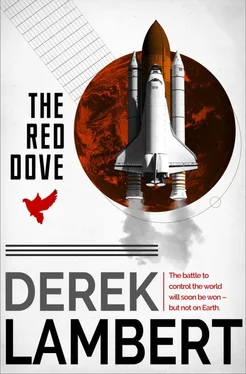What wouldn’t be laboured was the fact that the great asset of a shuttle, its re-usability, hadn’t yet been implemented, because, in addition to the fault in its glide controls, three other potentially disastrous flaws had been discovered in Dove I and she had been scrapped.
Talin frowned. There was something different about Dove II. Different, that was, apart from obvious modifications such as the emergency engines designed to take her back into orbit if there was a failure in the earth’s atmosphere.
He asked the Committee Chairman if there were any other differences.
An infinitesimal pause. A moment’s understanding between the Chairman and Sedov. Or is it my imagination?
‘Apart from the engines it’s virtually the same,’ the Chairman told him. ‘There have, of course, been some refinements. I don’t believe your landing,’ clearing his throat, ‘was quite all it should have been.’
Irritably, Talin said: ‘I know all about the modifications to the manual controls. Is that all?’
‘As far as I know. Major differences, that is.’
‘Well you would know, wouldn’t you.’
Sedov clumped an arm round Talin’s shoulders and said: ‘Come on, Nicolay, just because you’re getting married there’s no need to sound like a nagging wife.’
Talin shrugged. There could be a thousand minute differences which would never concern him. A bolt here, a hinge there… And yet.
The Chairman said: ‘Now perhaps you would like to meet the men who are building the fleet.’
‘Of course.’
Talin and Sedov shook a hundred hands. The regimentation of the exercise depressed Talin: this wasn’t what space was all about.
What had been achieved? Talin wondered on the way back to the airport. A boost for the factory workers to meet the men who were going to take Dove II into space? Work plans were full of incentives like that. A fillip to the cosmonauts who had been languishing since the flight of Dove I?
The rain had hardened to sleet. The wheels of the Lada threw up wings of slush.
‘Impressive, wasn’t it?’ Sedov remarked. ‘But I thought you were a little hard on the Chairman.’
‘He was a pompous little Tzar.’
‘A word of warning,’ Sedov said quietly. ‘Don’t let the Cult of Personality go to your head. Not everyone can look down on the frailties of Mankind from up there,’ jabbing a thumb towards the leaking heavens.
But that wasn’t it. There had been an understanding between Sedov and the Committee Chairman to which he hadn’t been admitted. It worried him.
At the same time that Talin and Sedov were shaking aching hands with the men building the Doves, Nicolay Vlasov, chairman of the KGB, was studying the daily reports from his deputies.
They were the key pages in his survival manual.
The reports were digests of intelligence from scores of KGB departments employing a secret army 500,000 strong. (Divide and Rule was the sub-title of the chairman’s manual.)
Within a few minutes Vlasov had digested pro and anti-Soviet intent throughout the world on information supplied by embassies, consulates, trade missions, spies, traitors – and satellites.
All this intelligence was supplied by the First Chief Directorate. Vlasov studied it dutifully but because treachery as well as charity begins at home it was the reports from the Second and Fifth Chief Directorates dealing with domestic matters that most interested Vlasov, the survivor. The activities of dissidents in the Ukraine, the activities of the Jews everywhere, suspicions of espionage at Saryshagan where scientists had developed CPB weapons, anti-State rumblings in cultural circles – even the Bolshoi was troublesome these days – protests smuggled out from camps housing Prisoners of Conscience…
At the domestic level Vlasov also had his priorities. First he absorbed any significant items about the behaviour of members of the Party hierarchy. The Politburo had tried to safeguard itself from its own secret police by establishing a watchdog, the Administrative Organs Department of the Central Committee: the KGB had retaliated by penetrating the private lives of Party VIPs through high-class stukachi, informers.
Watchdog watched watchdog and. Vlasov survived. But only just. What he desperately needed was an intelligence brilliancy to re-assert his power. With his instructions to find a way to negate America’s aspirations in space the President had given him a direction; what he still lacked was a vehicle.
Externally Vlasov’s grey-stone headquarters at 2 Dzerzhinsky Square, did not flaunt power. They were dingy, in fact. Long ago, before the Revolution, they had belonged to the All-Russian Insurance Company. Today, below ground, they also housed Lubyanka Prison; Lavrenti Beria, Vlasov’s most infamous predecessor, had been processed in Lubyanka before being shot, a salutory lesson to all his sucessors.
Vlasov’s third-floor office, however, did look like a seat of power. It had a lofty ceiling, long windows overlooking Marx Prospect and a king-sized desk with a battery of phones linking him to the Kremlin, the home of the President of the Soviet Union, his six KGB deputies and various other lackeys.
When he had time Vlasov examined some of the more detailed reports that accompanied the daily digests. Today he did have a little time. You never knew, there might be a vehicle of salvation among them.
He picked up a report from the Seventh Chief (itself comprising six sections) of the Second Chief Directorate which monitored the movements of foreign tourists in the Soviet Union, and perused some earnest prose from a girl named Natasha Uskova, Intourist guide to a package deal party from the United States. She had singled out one man as being worthy of consideration. Robert Massey.
The next paragraph would elaborate. Frowning, Vlasov lit a cardboard-tipped cigarette and tried to anticipate it. The name Massey rang bells. An American movie star? No, that was Raymond. Irritated with himself, Vlasov paced the spacious office: he prided himself that his memory was as keen as it had been in his youth but Robert Massey was testing him. Severely.
Space.
An astronaut.
A report from the KGB co-ordinator in the Soviet Embassy in Washington supplemented by information supplied by a paid informant at the Johnson Space Center at Houston.
Robert Massey had flown to the moon!
And come back crazy. Which was why the KGB co-ordinator in Washington had advised Moscow against pursuing rumours that Massey wanted to collaborate. He had been barking in the night, by all accounts.
Pleased with himself, Vlasov returned to his desk and read the paragraph that corroborated his memory.
But men who were still barking in the night didn’t get places on package deals.
Old zests – and new hopes – stirred inside Vlasov. The thrill of the chase when, as a young man employed by the MGB, forerunner of the KGB, he had been actively engaged in espionage in the West.
Why had Massey suddenly materialised in Moscow, apparently sane – according to Natasha Uskova? Had the Intourist operatives in Washington reported his booking to their superiors at the Embassy? If so, had the Embassy informed Dzerzhinsky Square? And, if they had, why hadn’t the information been promoted to the daily digest?
What so many agents lacked was instinct; they lost it in the labyrinths of bureaucracy. Well, he hadn’t lost his. He picked up a blue telephone and summoned Yuri Peslyak, head of the Second Chief Directorate.
It was five minutes before Peslyak put in an appearance. He had probably been speed-reading his underlings’ reports in case he was going to be put on the spot.
Peslyak, a bulky man with raggedly-cut black hair, a fleshy nose and quick dark eyes, sat in front of Vlasov’s desk and waited. He was a Georgian, like Stalin, and therefore a schemer.
Читать дальше
Конец ознакомительного отрывка
Купить книгу












